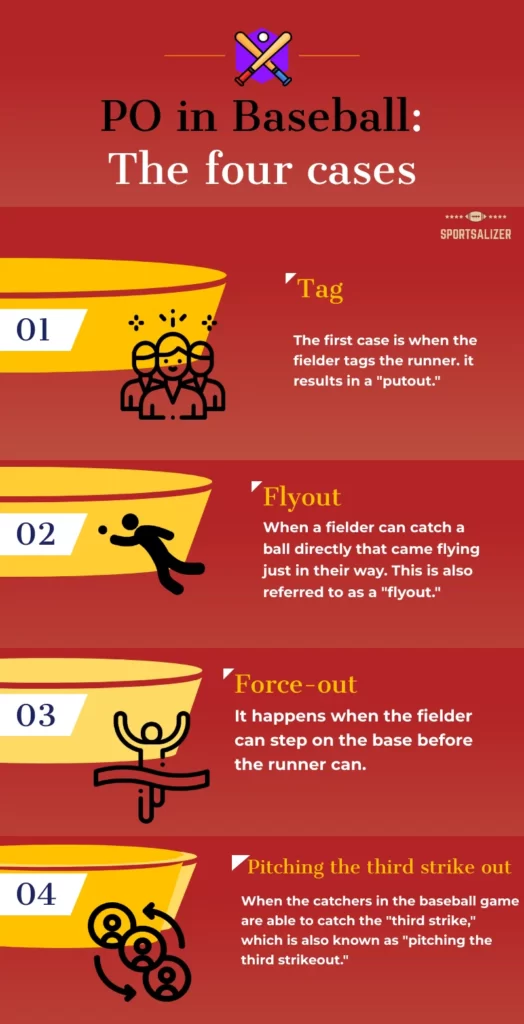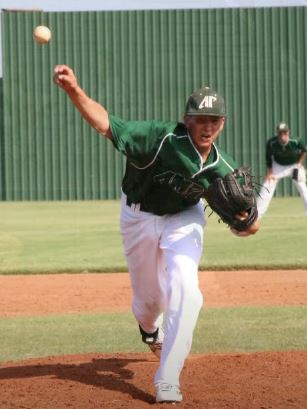PO in Baseball: Know all the 4 reasons behind it now

If you are a Baseball player, you are probably already aware of the PO in Baseball. But if you have just started watching Baseball, this may be a new topic for you. So let us give you a detailed insight into the subject, “PO in Baseball.”
PO is the acronym for the term “putout”. The phrase PO in Baseball is used when a fielder makes an out by various methods like pitching for the “third strikeout” or by a “catch.”
Contents
Cases where PO in Baseball is applicable
After hearing the most common terms like “strikeout,” “shutout,” there is another term “, putout.” This happens when the entire “out” is made and completed by the fielder only. So how is that done? There are four possible ways in which a Fielder can make an “out:”
- The first case is when the fielder tags the runner. it results in a “putout.”
- The second case is the most obvious situation when a PO in Baseball occurs. When a fielder can catch a ball directly that came flying just in their way. This is also referred to as a “flyout.” This particular PO in Baseball is not concerned with any specific fielding position but can occur at any time of the game and by any fielder in the field.
- The third situation is called a “force out.” It happens when the fielder can step on the base before the runner can.
- The fourth case is meant primarily for the “catchers.” When the catchers in the baseball game are able to catch the “third strike,” it is also considered a PO in Baseball. This is also known as “pitching the third strikeout.” This is referred to as such because the pitcher misses out on the final strike in this situation. Although this is also referred to as a “Strikeout'” credits are given to the pitchers as they are also responsible for the wicket.

Is Po in Baseball the same as an Assist?
What is the generic meaning of the term “Assist?” It means to help someone in achieving a common goal. Perfect! The term “Assist” in Baseball also does not have a very different meaning. It is a situation where a fielder helps the pitcher take the wicket of the opposing team’s hitter. But it is not as simple as it sounds. Let us explain to you in detail.
What is an Assist in Baseball?
According to the definition given in the official MLB website, as Assist is described as a situation when a fielder touches the “ground ball” before another fielder can record it before a PO in Baseball by another fielder. Two players can also do it simultaneously, where one takes the ball, and another fielder records the putout.
The difference between an Assist and PO in Baseball
The fundamental difference between the two is that when the fielder touches the ball and completes “the play” all by themselves, then it is considered a PO in Baseball and not an Assist. As long as the situation is such that a fielder touches the ball “unintentionally,” it would always be considered an assist.
Is it only the fielder who is credited for the PO in Baseball?
This is a ubiquitous question that comes to the mind of the readers or the people who are newly introduced in the PO in Baseball topic. And the answer to this question is NO! The fielder is not the only one in the game who gets the credit for the PO in Baseball.
After going through the four cases where a PO in Baseball is made, you are probably aware that even “Catchers” in the game get the credit for it. But you would be surprised to know that even the “First Baseman” is also in a position to get the credit for PO in Baseball. Let us explain all the three positions one by one.
Fielders
They are most commonly considered for defending the base and keeping the opposing team’s hitter from taking off and stealing the bases.
Catchers
The catchers are given credit for a PO in Baseball when they take the wicket by catching the flying ball, more commonly referred to as the “Flyout.” The advantage of the catchers is that they can take the PO in Baseball at any point in the game and be at any position.
First Baseman
Along with fielding in the First base position, they take care of the positions near it. They are also the ones to receive a lot of putouts b recording them on the “grounders” and “flyouts.”
Importance of PO in Baseball

Like, come on, what is all about those strategies that are followed? It is to improve and score higher in the game. That is the fundamental reason why PO in Baseball is required. It is used to make the score go higher. The PO in Baseball is like the backbone for the team. The more putouts that can be achieved, the better. This ultimately turns out to be one of the most crucial deciding factors of the fate for the team.
Another significant thing that is judged with the PO in Baseball is the performance of the batters. The scorer gets to make a detailed report about the movements made by the batter to cover the base by judging the number of them that were left out, scored, or were put out.
FAQs
Is there an advantage when there are only pitchers for PO in Baseball?
That may be a belief of some coaches. However, it can also be considered a very exhausting position of the pitchers. When a player is placed at a “PO pitcher” position, he gets to practice a lot more than the other pitchers.
Which Baseball player has the most number of PO in Baseball history?
Jake Beckley, commonly called the “Eagle Eye, ” has the record for the most number of PO in Baseball, which is calculated to be 23,743 putouts in his 19 years as an MLB player.
Conclusion
In a nutshell, the PO in Baseball is all about the moves made by the fielders, catchers, the first basemen, and even the batters. The Catchers and the first basemen often score most putouts, so keep this point in mind if you are the one batting.
However, there are situations when the putouts are just “pitchers only” part. That entirely depends on the decision of the coach, who gets to decide whether the pitchers are the only ones making the PO in Baseball. This is a strategy with no hard and fast rule attached to it.










